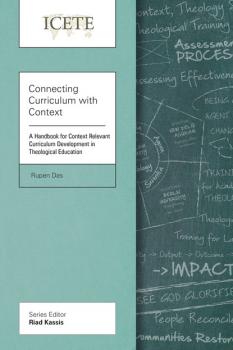ТОП просматриваемых книг сайта:
ICETE Series
Скачать книги из серии ICETE SeriesАннотация
The ICETE Programme for Academic Leadership (IPAL) was officially established in 2010 and arose out of the need to provide training to theological institutions in different regions of the world. IPAL provides a three-year cycle of seminars for the professional development of evangelical academic leaders and administrators to help institutions in their pursuit of quality and excellence in theological education.
This publication is the second of three volumes intended to accompany and support the IPAL seminars as well as independently providing wider access to the principles required by academic leaders for institutional and curriculum development.
Each chapter shares and illustrates the expertise and understanding the contributors have of education and curriculum design in the field of evangelical academic institutions. With an intentional awareness of a wide range of non-Western contexts, this volume is a much-needed guide for course administrators around the world.
This publication is the second of three volumes intended to accompany and support the IPAL seminars as well as independently providing wider access to the principles required by academic leaders for institutional and curriculum development.
Each chapter shares and illustrates the expertise and understanding the contributors have of education and curriculum design in the field of evangelical academic institutions. With an intentional awareness of a wide range of non-Western contexts, this volume is a much-needed guide for course administrators around the world.
Аннотация
Assessment of the impact of theological education has always been a challenge. In a pluralistic world where graduates are ministering in greatly varying contexts and cultures, theological education has to be context sensitive and relevant. It is no longer enough to ensure that students have mastered core theological concepts and truths, have biblical knowledge, and some basic ministry skills. The impact of a theological institution is measured by the effectiveness of their graduates in their specific ministry contexts. Therefore the theological curriculum has to be connected with the contexts of the graduates. Theological institutions need to be clear as to what they hope to accomplish and this will determine the model of theological training that they use. This book explores various models of theological education, as well as identifying steps in the logical sequence of connecting curriculum with context.
Информация о книге
Автор произведения Rupen Das
Жанр Прочая образовательная литература
Серия ICETE Series
Аннотация
Historically education has been driven from behind – the history, and above – the educational institution. Traditions and adherence requirements have led to inflexible models of school leadership that are focused on administration and rife with educational politics. In contrast, today’s theological landscape needs institutions with a grassroots-driven educational system, looking to a future that is biblically and theologically grounded. This publication, an English translation from the original German focuses on the leadership and curriculum development required for such a paradigm shift. Ott comprehensively assesses trends in current theological education across the world with detailed reference to wider trends in global tertiary education. Written primarily for those in leadership roles at theological schools and training institutions, this handbook is an essential resource for equipping the next generation of leaders in theological education.



